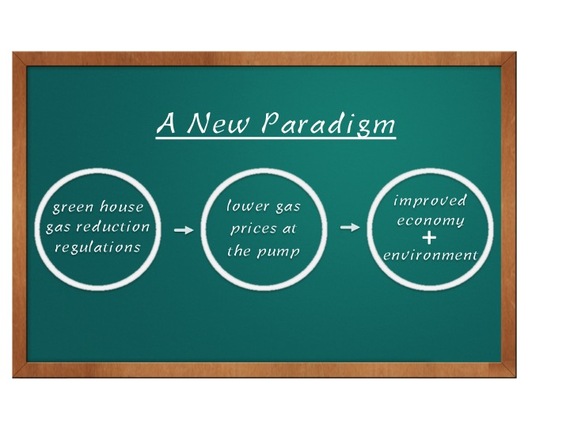It's the end of 2014, and we are enjoying a remarkable convergence. Gas prices are down, the auto industry is booming and we have the most environmentally clean vehicle fleet ever. In fact, if we'd been listening to industry over the past several decades, this should be an impossible confluence of events.
These industries repeatedly told Americans that mandating cleaner, higher efficiency vehicles would create disasters for consumers and the nation's economy. They insisted that environmental mandates and economic growth were opposed. According to them, you could try to fight pollution and global warming with government regulation, but you'd definitely be killing jobs and hamstringing American industry at the same time. They couldn't have been more wrong.
Today the government has enacted exactly what these companies were warning us about all these years. President Obama's greenhouse gas and fuel economy rules--which will cut carbon and double efficiency of 2025 cars to a fleet average of 54.5 mpg--are the strictest ever. If the doomsday predictions of the industry were correct, we should be plunging into an economic catastrophe right about now. Instead, gas prices nationwide have dropped about a dollar since the regulations were announced in August of 2010. Many analysts are predicting an upturn in consumer spending as a result of cheaper gas. It turns out that environmental action and business growth are not mutually exclusive. In fact, the lower gas prices are, in part, a result of fuel economy and greenhouse gas regulations.
Oil is a global commodity that trades in a fairly complicated market, but prices are still generally the result of supply and demand factors. Today's lower gasoline prices are often linked to the big increase in oil production by the United States, as well as a recent decision by several other big oil producing nations not to reduce their output. The near glut of oil in the market has continued to push prices downwards, but that's only part of the equation.
Gas prices have also been falling steadily since June because of weakened global demand for the product. According to a recent U.S. Energy Information Agency report, one of the primary drivers of this decrease in gas usage is the United States' new fuel economy rules. High efficiency vehicles consume less fuel, resulting in weaker demand and lower prices. In other words, the less gas we consume as a nation, the less we pay per gallon, and the fewer greenhouse gas emissions we create. Strong environmental policy is saving Americans money at the pump, no matter what they are driving.
As important as increased fuel efficiency is in both the fight against global warming and high gas prices, there is another measure that is even more important in reducing the negative impact that high oil prices has on our economy. Developing viable alternatives to petroleum fuels is essential.
Cutting greenhouse gas emissions and increasing fuel economy will help keep gas prices lower, but it does nothing to dislodge oil from its monopoly position within transportation. This dominance of petroleum in one sector tends to have a very negative impact on the economy as a whole. Here's why: Almost every machine that goes places--automobiles, heavy trucks, ocean-going vessels, airplanes--relies entirely on petroleum-based fuels. When the price of oil goes up, drivers and fleet operators and airlines have nowhere else to turn. They simply pay more, often charging their customers higher costs for the same work. Because every other sector of the economy is in turn reliant on transportation for distribution and delivery, millions of companies suddenly have increased costs without any benefit. So, when oil prices spike, companies and consumers across the country begin cutting back on everything else--hiring fewer people, canceling equipment upgrades, buying fewer products, eating out less often--which can quickly grind the whole global economy to a halt. Given these dynamics, it's not surprising that, in one study, every single economic downturn was immediately preceded an oil price spike.
The only one way around this vicious cycle of global busts is to offer consumers, trucking companies, airlines and automobile fleets an alternative to oil, be it electricity, renewable fuels, hydrogen for fuel cells or other fuels. Viable alternatives to petroleum-derived fuels would fight climate change while insulating both the national and global economies from price shocks by breaking oil's monopoly power. Once again, what is seen as a merely environmental initiative actually has a much broader positive impact.
It turns out that the industry is right: fighting climate change will have serious impacts on the economy. What they didn't tell you is that the choice to fight global warming and air pollution is also our best chance to have cheaper gas, a more stable economy and greater energy security.

